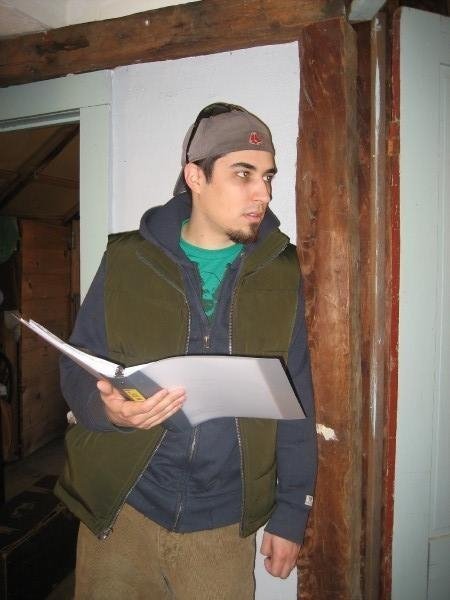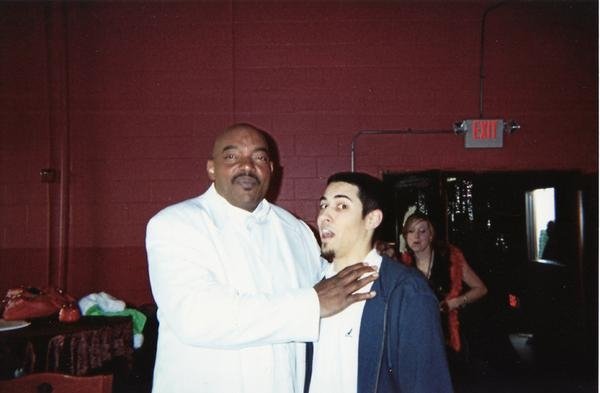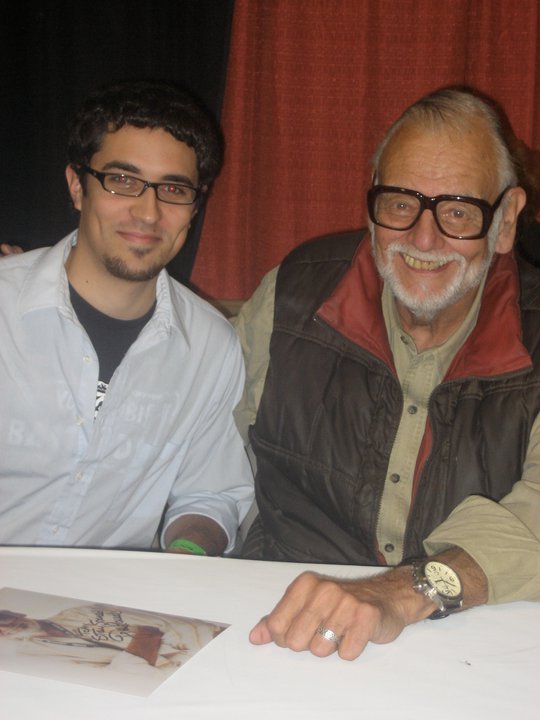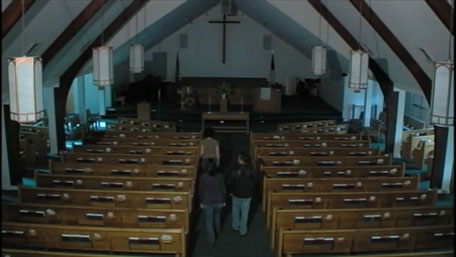
Sweetback (SB): Ok! Let’s start at the beginning. What films – or other media – most strongly influenced you growing up, and when did you first know you wanted to be involved in film-making?
Tony Nunes (TN): I was always (and still am) a big science fiction geek. The movies I watched more than any other growing up were the ones that transported my imagination the farthest. I obsessively watched movies like EMPIRE STRIKES BACK, GHOSTBUSTERS, INDIANA JONES and BACK TO THE FUTURE. Steven Spielberg and Jim Henson quickly became my idols and in sixth grade I wrote a biography on Henson that triggered a desire to create my own worlds and characters. I started writing lots of short stories and that same year saw JURASSIC PARK about seven times in theatres. That was the first movie I’d seen in theatres that elicited an emotional response from its audience. Watching people scream and recoil from the screen, that’s when I knew I wanted to make movies.
SB: You went on to pursue a B.A. in Film Media from the University of Rhode Island. Was the plan always to move into directing?
TN: I was a massive video production nerd in High School so film school was my goal since freshman year. I went into film school with dreams of becoming a big director. Who doesn’t? I even managed a video store like Tarantino did, so in my mind I was one step closer than most. I did a bunch of short films in college and a directed a 30 minute documentary I produced while living a month abroad in Tanzania. My plan was to direct my first feature after graduation, which I did with ZOMBIE ALLEGIANCE.
SB: Your early film-work presents you as a jack-of-all-trades. You acted and did script supervision for Richard Griffin’s films SPLATTER DISCO and BEYOND THE DUNWICH HORROR. Can you talk a little about your experience working on these productions? It must have been a thrill being involved in productions featuring Romero vets like Ken Foree and Lynn Lowry.
TN: I did an internship my senior year with a post-production house in Providence. I had the tedious (but kind of awesome) job of editing old Transformers and GI Joe episodes from the eighties down to 10 minute chunks for one of Hasbro’s websites. Richard Griffin and Caleb Emerson (DIE YOU ZOMBIE BASTARDS) were renting an editing suite to finish their film PRETTY DEAD THINGS, and one day, escaping tedium I got to talking with them both. Next thing I knew I was working for the script department on Richard’s next film SPLATTER DISCO. That was my first experience on a film set, and Richard taught me more about filmmaking than I’d learned in four years of film school. Me and Richard instantly hit it off with our shared un-pc sense of humors, and I’ve been working and friends with him ever since.
Ken Foree and Lynn Lowry were both wonderful to work with as well. Ken in particular, fresh off of shooting THE DEVIL’S REJECTS, seemed to really love SPLATTER DISCO’s indie sensibility. Ken and Lynn and the films other stars Trent Haaga and Debbie Rochon were all down to earth and unlike anything you’d expect from people who’ve been in the business for years. That film set became a kind of small family, and many of us have worked together on numerous projects since. To date I’ve worked as script supervisor for Griffin’s SPLATTER DISCO and BEYOND THE DUNWICH HORROR, both of which I had very small roles in as well. I was also First AD on Scorpio Film Releasing’s (Griffin’s company) NUN OF THAT, Second AD on ATOMIC BRAIN INVASION and wrote the screenplay for THE DISCO EXORCIST and its sequel, BROTHER OF THE DISCO EXORCIST which I’m writing currently. Richard even acted as Director of Photography on my film ZOMBIE ALLEGIANCE.

SB: ZOMBIE ALLEGIANCE shows an obvious love and reverence for both zombie films – particularly those that embrace social commentary – as well as post-apocalyptic survival stories. However, the zombie genre has become rather overstuffed in the past decade. What were you looking to bring to your film to separate it from the dozens of low-budget zombie features that are out there?
TN: I wanted ZOMBIE ALLEGIANCE to be more about the people trying to live in this post-apocalyptic world than anything else. I intentionally set the characters in a place far removed from most of the actual zombies, making the threat itself the real villain of the story. I find that ideological polarization is increasing in this country. With ZOMBIE ALLEGIANCE I tried to put a group of characters together with divergent social and political sensibilities. The point is to see if these people choose to come together or escape back into the zombie wasteland in order to avoid common ground.
SB: Let’s talk a bit about the production history of ZOMBIE ALLEGIANCE. I’ve found hints of it filming as early as 2008, but it didn’t actually get a proper release until recently. What was the delay?
TN: We started filming in the Spring of 2008 and completed shooting that Fall. I began editing the following Spring and finished the film in the Fall of 2009. Because the film’s budget was so small, it took time to finish everything. This was truly a micro-budget film.
SB: Balancing political commentary and horror is a difficult balancing act; particularly for a first time director. Was there a concern that by focusing so strongly on the commentary you might alienate less conscientious genre fans?
TN: This was always in the back of my mind, but I never intended to make a horror film in the strict confines of the genre. I understand that a large chunk of the demographic sees a title with Zombie in it and instantly expects a certain quota of zombie action and guts. But that’s not me. My favorite zombie movie is Romero’s DAWN OF THE DEAD. Nobody can do political horror like Romero can. I wanted to take the framework of Romero’s world and ground it in the reality I saw cropping up around me as I wrote the screenplay. At the end of the day I hoped horror fans would like it, but I knew this was going to be an extremely low budget production, and made the decision to focus on my characters above all else.

SB: Casting on a low budget is always difficult, and your story necessitates a rather large cast that have to spit out a great deal of dialogue. Some of the actors and actresses have a lot of low-budget experience, while others are total novices. How did you go about casting, and what it a particularly difficult process?
TN: For my core cast I held auditions. Luckily, New England is full of very talented actors and actresses eager to work in indie film. We actually have a really awesome film community around Rhode Island and Connecticut, where I filmed ZOMBIE ALLEGIANCE. The whole process was entirely new to me, but went extremely well. I wrote the movie with an actor already in mind to play the lead character Josh. I’d worked with Brandon Aponte on two previous films and thought he was suited for a heroic lead. Luckily he was onboard, and proved me dead on right. Half of the cast I’d previously met working on film shoots with Scorpio Film Releasing. Others just naturally fit their parts during auditions. I was particularly lucky that the actor I had originally cast to play the villainous George dropped out at the last minute. Don’t get me wrong, I was panicking at first, but I had just received an email that same day from Andre Boudreau, an actor who missed the auditions. I watched a short film he starred in and hired him on the spot.
I can’t imagine anyone else playing that role. What luck.
SB: Can you talk a little about Rich Tretheway, who plays Saul Carter in the film? He’s really quite wonderful in what is a very difficult, morally complicated role.
TN: Rich Tretheway is one of my favorite people. He’s an amazing actor and one of the kindest people I’ve ever come across. When writing the screenplay I had a certain image in mind for each character. I actually found Rich’s profile on a local casting site and thought he looked perfect for Saul, the character he plays. I shot him an email and he showed up at the auditions. I was praying he could act, and he absolutely exceeded all of my expectations. Saul, his character in Zombie Allegiance is really the moral fiber that holds the entire film together. I wrote his character to represent the qualities I consider a decent person would possess. I don’t think that was too much of a stretch for Rich. I have a dream project I plan on writing next that I would love to have Rich take the lead on. All I can really say about it is that it’s a sci-fi film of sorts that plays on my childhood fascination of the space program in the eighties.
SB: You made great use of real locations in ZOMBIE ALLEGIANCE, but the centerpiece is the farm in which most of the action takes place. How did you end up getting access to it, and was it a difficult shoot?
TN: That farm is actually two separate locations. The primary location, where most of the exteriors were shot is a real farm in North Stonington Connecticut. The farm was my wife’s grandfathers and I’d wanted to shoot a movie there since the first time I saw it. It was definitely past its heyday and most of the buildings were overrun with junk and overgrowth. There’s one field in particular full of really old cars covered in rust and decay. It was the perfect spot to film a post-apocalyptic film without dropping tons of money on production design. Shooting there in summer was really tough however. It was hot and one night shoot in particular was so infested with mosquitoes that we could barely finish.
That’s the price you pay for shooting on location in the woods of CT. The interiors were mostly shot in an old house on a shopping commune called the Fantastic Umbrella Factory in Charlestown Rhode Island.

SB: Actually, on a similar note there’s a terrific scene that takes place in what is obviously a very real church. Considering the film’s obviously combative relationship with spirituality, how were you able to get permission to film in there?
TN: That’s actually the church I attended when I was a kid. I hadn’t been back there in years, but I needed a church so I figured I’d take a gamble and call the pastor that runs it. All I said was that I was filming a movie and needed a church to shoot in for a day. Without hesitation (or questions) he said absolutely, and we had the church to ourselves. That was a great shoot actually.
SB: Was finding distribution a difficult process? Did you have difficulty attempting to submit it to festivals?
TN: I only really showed the movie in a couple of festivals, which was pretty simple actually. As far as distribution is concerned, I had originally intended to self release ZOMBIE ALLEGIANCE. Everything was set from the menu designs to the DVD sleeves. The more I thought about it though, the idea of selling the DVD myself seemed like a daunting task I feared would fail horribly. Under advice from Richard Griffin I sent a copy of the film to Alternative Cinema who produced SPLATTER DISCO and distributed a number of Griffin’s other films. Lucky for me they had just established a new indie label, Independent Entertainment, and released ZOMBIE ALLEGIANCE soon there after. I was ecstatic to have my first film, this low budget work I put so much of myself into released to the world.
SB: You’ve continued to direct, but aside from acting and directing you’re also a freelance writer; with much of your work appearing on the Dreaming Genius site that you co-founded. Do you find that being a cultural critic, and exposing yourself to many facets of pop culture, is helpful in your development as a director?
TN: I’ve grown to realize what I actually want to be doing more than anything is writing. ZOMBIE ALLEGIANCE gave me the opportunity to try out the director’s chair and it didn’t fit as well as I’d hoped. I’ve decided to focus on writing now more than anything else. Ever since college I’ve enjoyed writing arts and entertainment features and reviews. I currently write for Fangoria Magazine as well as my own site Dreaming Genius. With Dreaming Genius I’m able to more thoughtfully explore other films, TV shows, music and books which help me break down the creative process of others in ways that help my own process.
SB: What have you been working on since ZOMBIE ALLEGIANCE, and what future projects should we be looking out for?
TN: After writing ZOMBIE ALLEGIANCE I wrote THE DISCO EXORCIST for Richard Griffin. That film has been really well reviewed since its release a few weeks ago from Wild Eye Releasing. I’m currently writing a sequel called BROTHER OF THE DISCO EXORCIST, which is without a doubt the most fun script I’ve written to date. I plan on staying focused on screenwriting for the foreseeable future. I have about three other projects in early development including the space program film I mentioned earlier. Who knows, maybe one day I’ll fall back into the directors chair, but for now, I have a handful of stories I need to get out of my system.
SB: If readers want to pick up a copy of ZOMBIE ALLEGIANCE, or keep up on what you’re working on, what are the best ways to do so? (Plugs, social media links, etc. Anything you need to promote)
TN: You can find ZOMBIE ALLEGIANCE on Amazon.com and Pop Cinema. You can pick up a copy of THE DISCO EXORCIST on Amazon.com as well. To read some of my arts and entertainment features and reviews check out Dreaming Genius where I cover everything from film, music, art, comics, TV and books. You can follow me on Twitter as well @TonytheNunes.
SB: And, finally, now that you have a few films under your belt, what advice would you give to young film-makers looking to make their first feature?
TN: My advice is to put your self out there and do it. Make a movie. Don’t hold back. Surround yourself with creative and supportive people and you can create whatever you envision. If you wait for all of the most perfect conditions you’ll never accomplish anything. Make your own dreams come true. It’s okay to have enormous goals (I do), but remember that starting small is far better than waiting forever for those dreams to come true. Finally, make sure to marry someone who will champion even your most ridiculous ideas. Without my wife at my side I wouldn’t have accomplished anything. Knowing that I have at least one fan on this planet keeps me working to accomplishing my own dreams.
Sweetback
- [NO-BUDGET NIGHTMARES] PODCAST #80: PLAGA ZOMBIE (1997) - July 25, 2016


No Comments